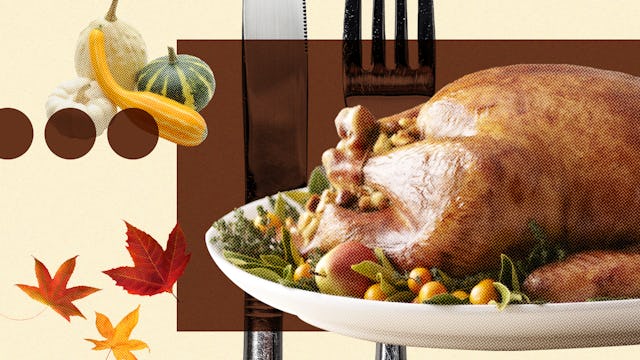My Teen Questioned Me About Thanksgiving, And I'm Here For Her Critical Thinking

The other day, my teen piped up during breakfast, “Isn’t Thanksgiving cultural appropriation?” I asked, “Where did that come from?” She said the idea just popped into her mind. I wasn’t prepared to answer her in the moment, but after some swigs of coffee, I busted out some of the true-story Thanksgiving books we’d purchased last year.
We talk about cultural appropriation, red-lining, colonization, microaggressions, and many more topics quite often in our home. Being a multiracial family means confront these subjects head-on—frequently. I appreciate my daughter’s question, which prompted me to wonder (for another year in a row) if we should even be celebrating Thanksgiving at all. After all, isn’t it the ultimate colonizer holiday—well, in addition to Columbus Day? (I also loathe the 4th of July, but that’s an article for another day.)
Thanksgiving has my teen thinking, and prompting me to do the same. Are we hypocrites for celebrating? Is there a good way to celebrate Thanksgiving? Should we completely ditch the holiday? Is it okay that we just eat with family—paying no mind to the gross pilgrims-and-American-Indian stories? Raising my four kids to think critically has been an adventure, to say the least.
I shouldn’t be surprised this topic popped up when it did. Every fall, we have deep conversations about Halloween, the ultimate cultural-appropriation fest. We’ve talked about why it’s not cool for a white child, for example, to dress as a Native American warrior princess, and why blackface is never, ever okay. This has led to discussions about cultural appropriation versus cultural appreciation.
Raising tweens and teens who are beginning to embrace deeper and critical thinking is interesting. Instead of us just telling our kids that racism, homophobia, ageism, the patriarchy, and so much more are wrong—and why—they are exploring these topics for themselves.
Two weeks ago, we had an all-out abortion conversation—once again, during a meal. Instead of me getting on my soapbox (as I tend to do), I asked my kids what they thought. The counterarguments were lit. Well, as lit as possible with kids.
Along with their critical thinking comes criticism. Basically, I get called on my crap sometimes—by my kids. For example, when I enforce the one-dessert-a-day-rule, my kids are quick to point out that I had chocolate after lunch and a cookie after dinner. (Oops.) Goes to show that actions really do speak (to our kids) much louder than words. Check yourself, parents.
The way my kids can question policies — for example, racist dress code policies — makes me beam with pride. They can see the inequities, which means they will be more empowered to call them out. Why can hairstyles only be so tall when Black kids typically have hair with more volume? Hair-length policies have also been used to weaponize Blackness and police Black children (and adults). Welcome to systemic racism, which invades almost every space.
We’ve had conversations about why my kids, unlike their white friends, cannot play with toy, foam-bullet guns outside of our home. One day, my husband took my son to the park. My son spotted a classmate who was playing with a toy gun and foam bullets. My son was interested in playing, too, but we had to remind him that it wasn’t a safe choice. This was a hard but necessary conversation, one that led to more conversations about policing and “justice” system inequities.
Some (always white people) have warned me that we need to protect our kids’ innocence and not have them worrying about things that are for adults. However, children of color aren’t privileged like white children—children who can play with a toy gun at a park without fear of being killed. We’ve talked about why they have rules that their white friends and cousins do not. For example, my kids aren’t allowed to wear their hoodies up in a store, and we require them, no matter how small their purchase, to get a bag and a receipt. To many white people, these are over-the-top and overprotective requirements, but for our kids, they are safety necessities.
We want our kids to be okay asking questions and understanding the “why” behind rules and behind history. We want them to make informed decisions, which includes celebrating holidays. Racism exists all the time, with no vacation days for national or religious holidays.
Another fantastic conversation we’ve had over the past few years is depictions of Jesus—especially around Christmas. As a Christian family, my kids are constantly telling people, “Jesus wasn’t white.” Historians tell us that Jesus was a melanin-poppin’ guy. The blue-eyed, blonde-haired, translucent-skinned Jesus never existed. So what’s up with all the pasty Jesus figures in nativities and in artwork?
Raising culturally aware kids is constant work, but it’s also gratifying. Two weeks ago, my teen’s class was discussing cultural appropriation. My daughter told the class that certain sports’ teams names are inappropriate and thankfully, some have retired and been re-named. It’s something most teens don’t give much thought to.
Do I think I’m over-burdening my kids by teaching them about historical inaccuracies and problematic policies? No. I think I’m empowering them to think critically and to stand up for what’s right. I also want them to not just parrot what others say. Instead, I want them to do their research and be proud of who they are.
As for Thanksgiving this year, we’re going to COVID-test and then meet up with our closest family members for playing football outside and eating. We’re also reading our Thanksgiving-accurate books this week in preparation for the holiday. This is our compromise, for now. As my kids get older, they can decide for themselves what this holiday will look like. It’s always open for discussion around here.
This article was originally published on